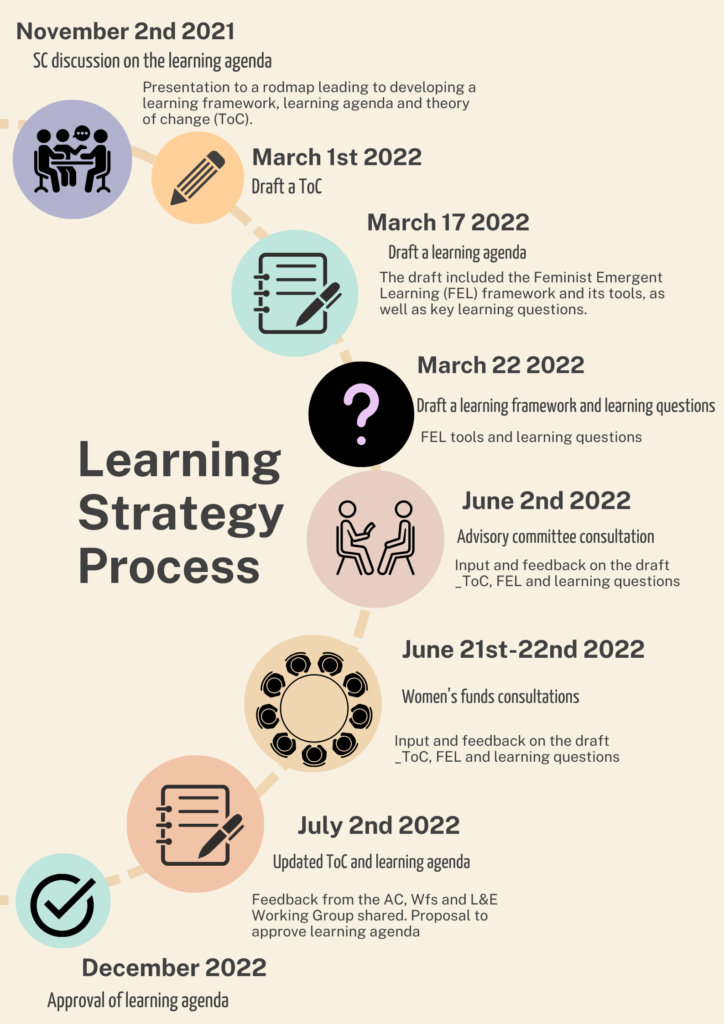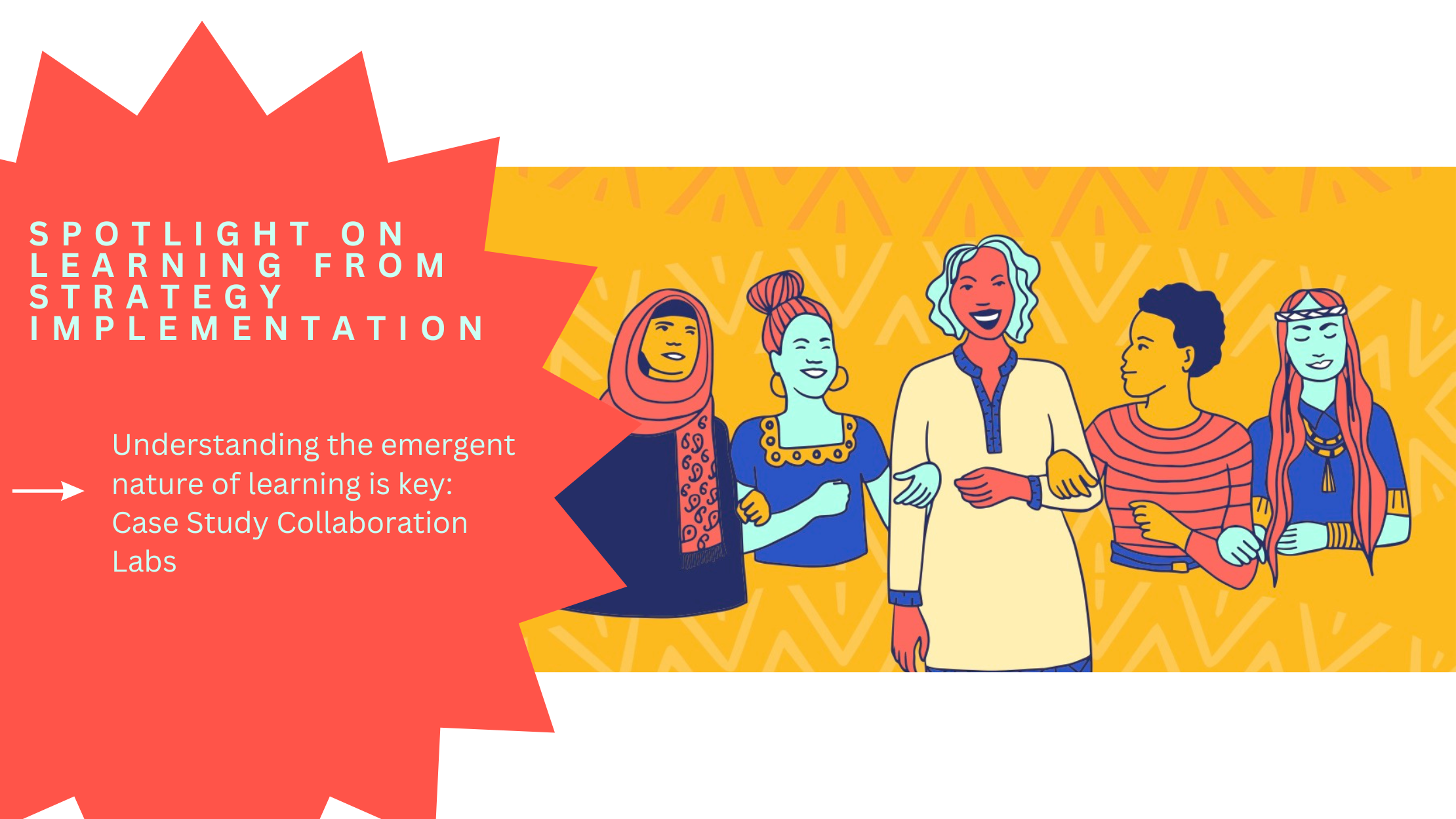Designing and Implementing the Fenomenal Funds’ Learning Strategy
Recently Fenomenal Funds was approached to talk about how we developed our Learning Strategy and what we are learning though the process of its implementation. This got me thinking that perhaps there may be others also interested in learning about our work and looking for practical examples to develop their own learning strategies and implementation frameworks.
In this blog I respond to three questions:
- How did Fenomenal Funds develop its learning strategy?
- What are we learning as we practically implement our strategy?
- What questions do you need to keep in mind as you prepare to design and implement a learning strategy in a complex environment?
Strategy Development
Fenomenal Funds is a bold complex experiment in feminist-funding. As a feminist funder collaborative, partnering with members of the Prospera International Network of Women’s Funds (INWF) our model combines pooled funding, shared governance, and participatory grantmaking. The stakeholders (women’s funds/feminist funds, private philanthropy, the Prospera INWF secretariat and Fenomenal Funds Staff) are interacting in a power-sharing process. We needed a strategy that responded to this unique model. The visual of building a plane while also flying it at the same time comes to mind as I think about our process.
As staff of Fenomenal Funds, we were tasked with crafting a collaborative process for the development of the learning strategy.
So we first needed to be clear on
- the purpose of our strategy
- what learning means to us and our partners
- which approach would be the right fit given our model, learning objectives and values
- what should the components of the strategy include
Our initial guidance for the strategy came from our Steering Committee who suggested that
- Learning needs to be integrated into the implementation of the model
- Process needs to focus on creating spaces for engagement and sensemaking bringing together WFs and Governing bodies at key points
- Clear distinction in role of Learning Partner and role of FF staff in the process
- Focus on learning & sharing in real time
- Don’t wait until the end to capture results/outcomes
- Process needs to be adaptive, emergent & participatory
- Needs to incorporate a feminist lens
This guidance helped us to clarify our line of sight for our strategy:

The strategy formulation was a year-long process that integrated multiple consultations and participatory learning and sharing sessions with women’s funds representatives of Prospera INWF and our funding partners. The process included parallel processes
- the conceptualization and articulation of Fenomenal Funds’ Theory of Transformation.
- the adaptation and adoption of a Feminist Emergent Learning Framework and our learning agenda
- the formation of the Learning and Evaluation (L&E) Working Group of the Steering Committee (our governing body) to support the governance of our Learning and Evaluation work.
We then began a literature search to look for learning frameworks already in use that we could learn from and adapt. This helped also to clarify how we understood learning and which approaches would be a good fit. During the literature search we came across Emergent Learning as an approach currently being used to support complex initiatives like ours. We went back to the steering committee with a proposal for a feminist emergent learning framework. Simultaneously we also started to think about what our vision for change and transformation are and what assumptions we are basing our actions on – this led to a preliminary diagram using MIRO – it was messy and iterative we kept going back and forth.
We dedicated a month of steering committee meeting time to learning and receiving feedback on our theory of transformation and learning framework. We also shared these rough sketches with women’s funds holding space online for input and critical feedback. Asking ‘Do the linkages make sense?’ ‘Are we reaching too far?’ ‘Is the context framing accurate?’ ‘Are we missing something in the assumptions we are making?’.
After a number of iterations we ended up with a draft strategy which was then reviewed and approved by our steering committee in December 2022. It then took us another six months to work with graphic designers to visualise the narrative.
Currently our strategy includes the following components
- Context
- Vision of Learning & Feminist Emergent Learning Framework
- Theory of Transformation
- Learning Agenda
- Operationalization of the Learning Strategy
The primary purpose of Fenomenal Funds’ learning strategy is to lay out a process that facilitates and guides deep reflection, critical inquiry, and real-time learning in collaboration with women’s funds. Our strategy lays out key elements that help us to improve our work and inform course correction based on evidence generated from operationalizing our model. We are guided by four outcomes (add link) so that we remain responsive to the needs of women’s funds. A reflexive approach contributes to the ongoing process of refining our model and supports us towards achieving Fenomenal Funds’ outcomes by 2025. Our aspiration is that our collective learning will influence and consequently contribute to philanthropic actors in the ecosystem, incrementally shifting power in philanthropy towards an equitable balance between Women’s Funds/Feminist Funds & Funding Partners.
The implementation of the strategy is guided by our learning framework, our learning agenda and governed through oversight from the standing Working Group on Learning and Evaluation of the Steering Committee. We are also supported by external learning partners to do additional in depth analysis of our grant making and governance processes.
What we have learned from the strategy development and implementation process is that in order to implement such a strategy there is a need for ownership and acceptance of the process being iterative. Ownership for us was created through taking the time to really engage with partners and get their input and perspective. Documenting the process and its various iterations and going back to the original guidance provided to provide us with a line of sight.

One of the learning spaces we curated were the collaboration labs. These were a phased process to support the ideation of collaboration plans by women’s funds/feminist funds to work together across scope, scale and geographies to support organisational strengthening through participatory grantmaking (For more information see our blog on our Collaboration Grants). The labs were set up to be implemented over a four month period in which Fenomenal Funds would hold space with the aid of external feminist facilitators and documenters for women’s funds to come together and form collaborations on a topic and propose a two year plan with a tentative budget which would then be funded under a grantmaking stream. We prepared an extensive orientation plan for our facilitation teams. Set up a data management system and feedback loops. Organised individual bi-weekly check-ins with facilitation teams as well as collective check-in and critical reflection spaces to take a pulse on how the process was emerging.
Through the feedback loops and critical reflection with facilitation teams we learned that we had to rethink our assumptions. We assumed that women’s funds who were members of the network would know each other and their work and so it would be easy to form connections and identify collaborations they wanted to be a part of. Unfortunately this was not the case as many of the funds did not know each other and it took much longer to establish connections before they could decide on what collaboration to join. It also took a lot of time to come to clarity on a plan and the process of feminist collaboration is extremely labour intensive. Funds needed a break and so despite holding space for the funds we had to go back to the drawing board to rethink our assumptions around the process of learning.
The processes we set up to reflect on our learning were essential. What we learned from the implementation of the feminist emergent learning framework is that care and wellbeing need to be factored into the learning process and breaks are important. Having the flexibility and resources to change plans and make timely adjustments to deadlines is also important. What we learned is that you can have a plan but if the plan is not meeting the needs of those whose learning it is set to hold space for then we need to rethink the plan. Sometimes our plan is also based on assumptions and we need to be open to saying well those were wrong assumptions – and go back to the drawing board and rethink how we need to proceed. This is all learning, but it is learning that is intentionally well resourced both in terms of time, people and capacities to implement this iterative complex emergent agenda.
Preparing to develop and implement a learning strategy in a complex context
We leave you with some questions we have formulated which are distilled from our learning to date that may help with preparing to design and implement a learning strategy for a complex experimental model
- Do you have clarity of purpose, a line of sight for your strategy? (Clear Focus on purpose and vision)
- Do you have alignment between who you are and how you want to learn?
- Who are you going to engage (your constituency for your strategy) and how are you going to engage with them?
- How will you put the strategy into practice
- Have you thought about how you will resourcing learning
- Do you have the capacity internal/ external to implement the strategy
- How will you take decisions on course of action/ or course correction (governance framework or working group)
- Is your group able to think creatively, and is innovation encouraged?
- Is it representative of your constituency/communities you serve and your partners
- Can your group or is your group able to acknowledge that something didn’t work and try another strategy?
- Does your group have access to quality information to support effective decision-making?
- Are you clear about desired outcomes? Are you developing an understanding of how and why they will happen?
- Are you developing a working theory of action and change?
- Do you have systems, tools and processes in place to gather and store data, and is there capability to produce good-quality reporting for decision-making for the group?
- Can you collect, analyse and make sense of data – do you have a system in place and people to do this?
- Are you supported to put into practice what you are learning from data and evidence?

